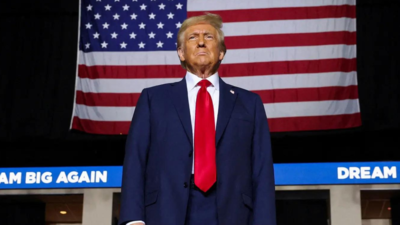
US President-elect Donald Trump is poised to intensify his crackdown on illegal immigration and restrict legal immigration when he returns to the White House on January 20, 2025. Trump reaffirmed his approach to immigration during a campaign rally in Duluth, Georgia, saying, “Immediately upon taking the oath of office, I will launch the largest deportation program in American history.”
The following are some of the immigration policies Trump is expected to implement during his second administration:
Mass deportations
Trump has announced plans to enact large-scale deportations if he returns to office. This initiative, aimed at individuals residing in the US illegally, seeks to return millions to their countries of origin. The president-elect intends to utilize executive orders to increase immigration enforcement immediately upon assuming office. He confirmed on his social media platform, Truth Social, that this would involve declaring a national emergency and deploying military resources, with the aim of surpassing any previous administration’s deportation numbers.
Trump’s plan directly contrasts with President Biden’s current immigration policies, which prioritize apprehending serious criminals while minimizing action against those without criminal records. Trump has pledged to reverse these policies immediately upon taking office.
During his 2020 campaign, Trump described the deportation process as “a bloody story.” He also expressed openness to constructing new detention centers for migrants.
Texas has offered Trump approximately 1,400 acres of land near the US-Mexico border to aid in this effort. The use of the National Guard, and possibly federal troops, to apprehend and deport individuals is also under consideration.
Trump’s plan includes deporting immigrants with criminal histories and suspected gang affiliations. He intends to utilize the Alien Enemies Act, a law enacted in 1798 and last implemented during World War II to detain individuals of Japanese, German, and Italian descent.
Stephen Miller, a key architect of Trump’s previous immigration policies, is expected to play a significant role in a potential second term. Miller has suggested the possibility of deploying National Guard troops from supportive states to less cooperative ones to facilitate deportations. This strategy could spark legal disputes.
Trump has also previously advocated for the death penalty for migrants who commit murder against US citizens or law enforcement officers.
Current deportation figures under the Biden administration have already surpassed any single year under Trump. In the 2023 fiscal year, 468,000 migrants were either deported or returned to Mexico by US immigration authorities, with projections indicating a higher number for the current year.
Enhancing border security
Trump has pledged to increase border security on his first day back in office by sending National Guard troops to the US-Mexico border and restarting construction of the border wall. He plans to utilize a national emergency declaration to secure funding for the wall.
Trump also intends to reinstate his “Remain in Mexico” policy, which requires asylum seekers to stay in Mexico while their cases are processed in US courts. Additionally, he aims to detain all migrants apprehended crossing the border illegally, ending what he calls “catch and release.”
Furthermore, Trump plans to implement travel bans targeting individuals from specific countries or those with certain ideologies.
“Anywhere else that threatens our security,” Trump said in an October 2023 speech, outlining potential targets for renewed travel bans, including the Gaza Strip, Libya, Somalia, Syria, and Yemen.
Trump also aims to curtail legal immigration by ending humanitarian “parole” programs enacted by the Biden administration, which have allowed a significant influx of migrants with US sponsors. He intends to reduce the number of refugees admitted to the United States.
Defending family separations
Trump has defended his administration’s controversial family separation policy at the US-Mexico border. In a November 2023 interview with Univision, Trump said that the policy, which separated thousands of migrant families in 2018, “stopped people from coming by the hundreds of thousands.”
During a CNN town hall last year, Trump declined to say whether he would restart the policy if re-elected. The policy sparked widespread condemnation and legal challenges.
Trump’s potential “border czar,” Tom Homan, expressed reservations about the policy. Homan told Reuters last year that the separations “caused an uproar” and suggested it would be preferable to detain families together.
The Biden administration reached a settlement agreement in 2022 with families separated under the Trump policy, granting them temporary legal status and other benefits. The agreement also prohibits similar family separations for at least eight years.
Ending Deferred Action For Childhood Arrivals (DACA)
The Trump administration has confirmed it will not accept new applications for the Deferred Action for Childhood Arrivals (DACA) program and will seek ways to end it. DACA, established during former president Barack Obama’s administration, provides temporary deportation relief and work permits to eligible immigrants brought to the US illegally as children. Trump has repeatedly expressed his opposition to the program.
According to a New York Times report, Trump plans to try to end DACA. His decision follows a Supreme Court ruling in June 2020 that found the Trump administration’s attempt to end DACA was improper but did not rule on the program’s legality. The Trump administration said it would explore other legal avenues to end DACA.